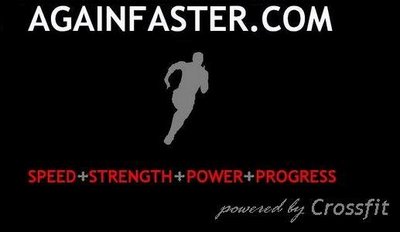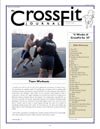 A Physics Lesson
A Physics LessonWhy Pyrros Dimas can kick your ass
The reward you get from a particular activity is usually proportional to its difficulty. The harder it is, the more you get out of it--in the form of muscle growth, endurance, and speed.
Olympic lifting is one of the hardest activities out there. You're required to move large weights over long distances very quickly.
Why is it hard? A little physics lesson:
Work is equal to the force applied to an object, multiplied by the displacement, multiplied by the cosine of the angle of displacement. The result is a unit called Joules. I know you want to stop reading right now, but don't. You might learn something.
Work = force (N) * displacement (m) * cosine angle of displacement (theta)
When we're talking about O-lifting, the force (pounds/kilograms converted to Newtons) and the displacement (feet/meters) are in the same direction--more or less straight up. The angle of displacement (the difference between the direction of the force and the direction of movement) is zero in this case, and the cosine of zero is one. You should notice that the relationship is linear--the more you lift and the further you lift it, the more work you're doing.
As an example, let's say we move 75 pounds (~34 kg) from the floor to overhead. Let's say the total distance is 7 feet (~2.13 m), and we move the weight at a constant speed. We must apply enough force to overcome gravity. In this case, the force of gravity = 34 kg * 10m/s/s = 340 Newtons. Therefore, to move the weight upward at a constant speed, we have to apply 340 N of upward force.
Work = 340N * 2.13m * cosine 0 = 724.20 Joules
The more weight we move and the further we more it, the more work we do. If the weight was 150 pounds instead of 75, we'd get:
Work = (68 kg * 10m/s/s) * 2.13m * cosine 0 = 1448.40 Joules
Twice as much weight yields twice as much work.
How much weight would a benchpressing bodybuilder have to move to do this much work? Let's say he/she has to move the weight 2 feet (.61m).
1448.40 joules = (x kg * 10m/s/s * .61m * cosine 0)
x = 237 kg (522 pounds)
You can't do that in one rep, unless you spend a whole lot of time at Westside Barbell. For efficiency, you can't beat one C&J with 150 pounds. How many times would you have to bench 150 pounds to do an equal amount of work?
x = 1448.40 J/(68 kg * 10m/s/s * .61m * cosine 0) = 1448.40J/414.8J = 3.5 reps
If we assume a benchpress and a clean and jerk take the same amount of time, the C&J is 3.5 times as efficient!
We've taken into account that we're doing a lot of work, but how much power are we generating? Power is equal to work divided by time. The faster you lift (the less time it takes you), the more power you generate. Power output is measured in watts.
Power = work/time
The components of power:
Power =(force * displacement)/time
Power = force *(displacement/time) = force * velocity
This is intuitive. The stronger you are (force) and the faster you are (velocity), the more powerful you are. You do more work in less time! Sounds Crossfit to me.
Olympic lifting is fast and heavy. It requires a ton of work and a ton of power. You want to be strong and speedy? O-lifting is the answer--it'll get you there. Just remember, no matter how much weight you move, Dimas will always be better than you.




















5 Comments:
I'm pretty sure all those words were in English.
But I have absolutely no idea what you just said right there.
Talk about the pretty boys on the magazine covers again. I got that.
Thank you.
~ spartacus
haha--Sam handed me my head on this one:
"I skimmed to the part where you said lifting more weights is harder..."
Yep, another insightful article from yours truly.
Crazy bastard! 37 sections, huh? Oh, hell yeah.
wait just one second-you can't do harvard stadium workouts without me!
Heal up, Ali! I quit working for no woman :)
Post a Comment
<< Home